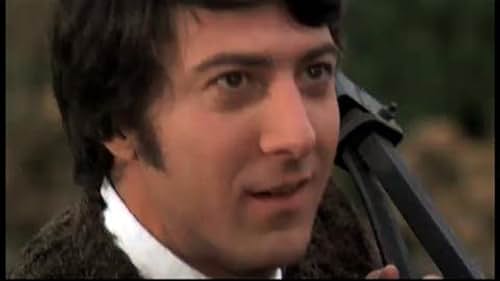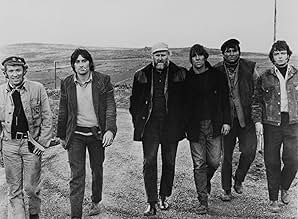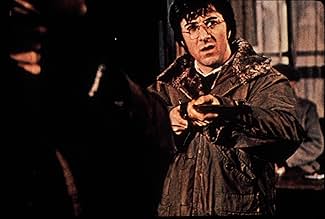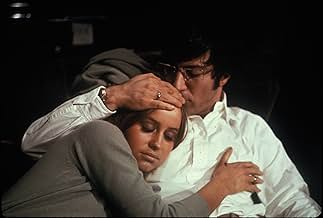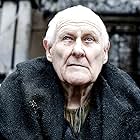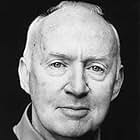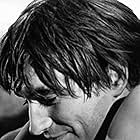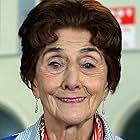A young American and his English wife come to rural England and face increasingly vicious local harassment.A young American and his English wife come to rural England and face increasingly vicious local harassment.A young American and his English wife come to rural England and face increasingly vicious local harassment.
- Nominated for 1 Oscar
- 1 win & 3 nominations total
Bob Keegan
- Harry Ware
- (as Robert Keegan)
June Brown
- Mrs. Hebden
- (uncredited)
Jimmy Charters
- Man in Pub
- (uncredited)
Chloe Franks
- Emma Hebden
- (uncredited)
Michael Mundell
- Bertie Hedden
- (uncredited)
- Director
- Writers
- All cast & crew
- Production, box office & more at IMDbPro
Storyline
Did you know
- TriviaIn the scene where David Sumner (Dustin Hoffman) first enters the local pub, director Sam Peckinpah was unhappy with the other actors' reaction to this stranger entering their world. Eventually, he decided to do one take where Hoffman entered the scene without his trousers on. He got his reaction, and these are the shots shown in the final film.
- GoofsWhen David is taken duck shooting, he fires his gun into the air at ducks flying overhead. Ducks can then be seen flying to the right and straightaway to the left, revealing that it is the same film reversed.
- Alternate versionsThe video version was twice rejected by the British Board of Film Classification in 1999 after the distributors refused to cut forcible stripping and any signs that Susan George was "enjoying" the rape. Video versions were available in Britain before the 1984 law which required all videos to be classified. There were two such releases, one of which was uncut, and one which lost some dialogue due to print damage. As of 1st July 2002, the full version of the film has been passed uncut for video and DVD release by the BBFC.
- ConnectionsFeatured in Kartal Yuvasi (1974)
Featured review
Straw Dogs(1971) reveals a primal human action that is the driving force behind its characters. As with Deliverance(1972), Straw Dogs also is fascinated with the violent urge within the human soul. The primal aspect of the human being is provocatively examined in Straw Dogs(1971). Sam Peckinpah forcefully depicts issues that were hinted at in The Wild Bunch(1969). Paints a dark picture of humanity with the person's frightening ability to harm at any time. The title of the film ties in perfectly with the nature of the story.
An interesting example of a vigilante film before the subgenre became fashionable. Films before had dealt with the theme of revenge but rarely as brutal or primal as in Straw Dogs(1971). Predates Death Wish(1974) by three years. The uncredited inspiration for Death Wish(1974) and others of its kind. Both films include Meek liberal men who explode with violent anger in different ways. Shows revenge and the consequences behind the act of revenge in a realistic dimension.
Straw Dogs(1971) marked the first film Sam Peckinpah did which wasn't a Western. The film's direction creates a powerful piece of cinema with a strong European sensibility. Its a shame Sam Peckinpah never did more European Thrillers after SD. One film which mixes the American style of Peckinpah's Westerns with the European touch of Straw Dogs(1971) is Bring Me the Head of Alfredo Garcia(1974). At times the movie looks as if it could have been done by Hammer Studios. An indication that the late filmmaker could succeed outside of the Western genre.
Good at showing that any person(even peaceful natured)can be capable of violent action at any given moment. The interactions between David Sumner and the Village Reverand is filled with subtle hostility. Represents the conflict between religion and science which is wittily enforced in the dialogue between the two. The locations of Cornwall becomes an important part of the film's emotion. Intense atmosphere is what gives the film a tinge of horror. Straw Dogs(1971) is in a couple of ways a British take on the Deliverance story.
There seems to be something autobiographical within the frames of the story. Deals with the idea of Man's violent rites of passage that Sam Peckinpah was only too familiar with. David Sumner symbolizes the private inner self of Sam Peckinpah's persona. The intense relationship between David and Amy Sumner was based on the director's experiences with marriage and relations with women. His direction of the actors is masterful. Has to be one of the director's most personal(perhaps his most personal)film of his directorial resume.
A notorious sequence from Straw Dogs(1971) is the infamous rape of Amy Sumner which plays a tricky balance between the abhorrent and the erotic without spilling over to either side. I can imagine the many people that were taken aback by this scene especially during the first rape when it turns into a love scene. Without the dark humor that was present in Stanley Kubrick's A Clockwork Orange(1971). Excellently edited scene with some powerful intercutting. Not an overly graphic scene but more psychological with the camera's focus on Susan George's face. Its the psychological abasement and reaction of Amy that is the true disturber of the senses.
There is an interesting sub plot between Henry Niles and Janice Hedden that is inspired by OF MICE AND MEN. The director was heavily influenced by the works of John Steinbeck, none so evident as in the characterizations of Henry Niles. Henry Niles is absolutely patterened after the strong but slow witted Lenny from OF MICE & MEN. David Warner pulls off an fantastic performance in a complex role. The scene in the church stable is reminiscent of Lenny and his bosses wife meeting in a barn during OF MICE & MEN. Henry Niles is alot like the misunderstood alleged witch of Don't Torture a Duckling(1972).
From the very beginning a confrontation between the house workers and David Sumner becomes inevitable. There is some major tension that grows to a boiling point until the hot pot explodes during the climax. The actors do a convincing job in displaying tension with their emotions. When the confrontation finally does happen everything becomes chaotic and violent. This part of the film may have influneced Wes Craven to a certain extent when he did Last House on the Left(1971). By the climax of Straw Dogs, David Sumner despises the house workers so much that he uses Henry Niles as an excuse to strike back at them.
Where the bloodbath at the film's finale reaches a fever pitch is when reason turns to bloodlust. When the confrontation began there were reasons for each group but as it progressed the two parties become more interested in killing each other. I find it funny that the two groups become less concern in finding Janice Hedden and more concern in fighting to the death. It just shows that protecting one's land or property is the most important thing to a man. David Sumner and the house workers battle each other in a manner similar to the landowners of the Middle Ages. Sombre use of slow motion effects and editing techniques turns the climax into a nerve twister.
Dustin Hoffman is very good in the role of the timid turned violent David Sumner. Susan George in her role projects both vurnability and eroticism. The film's climax would be rehased for the house attack in The Osterman Weekend(1983). When Sam Peckinpah also worked as a writer in his films the results were usually brilliant. This is the case with Straw Dogs(1971). Straw Dogs(1971) is an impressive film of an era when filmmakers were not afraid to take chances with risky subject matters.
An interesting example of a vigilante film before the subgenre became fashionable. Films before had dealt with the theme of revenge but rarely as brutal or primal as in Straw Dogs(1971). Predates Death Wish(1974) by three years. The uncredited inspiration for Death Wish(1974) and others of its kind. Both films include Meek liberal men who explode with violent anger in different ways. Shows revenge and the consequences behind the act of revenge in a realistic dimension.
Straw Dogs(1971) marked the first film Sam Peckinpah did which wasn't a Western. The film's direction creates a powerful piece of cinema with a strong European sensibility. Its a shame Sam Peckinpah never did more European Thrillers after SD. One film which mixes the American style of Peckinpah's Westerns with the European touch of Straw Dogs(1971) is Bring Me the Head of Alfredo Garcia(1974). At times the movie looks as if it could have been done by Hammer Studios. An indication that the late filmmaker could succeed outside of the Western genre.
Good at showing that any person(even peaceful natured)can be capable of violent action at any given moment. The interactions between David Sumner and the Village Reverand is filled with subtle hostility. Represents the conflict between religion and science which is wittily enforced in the dialogue between the two. The locations of Cornwall becomes an important part of the film's emotion. Intense atmosphere is what gives the film a tinge of horror. Straw Dogs(1971) is in a couple of ways a British take on the Deliverance story.
There seems to be something autobiographical within the frames of the story. Deals with the idea of Man's violent rites of passage that Sam Peckinpah was only too familiar with. David Sumner symbolizes the private inner self of Sam Peckinpah's persona. The intense relationship between David and Amy Sumner was based on the director's experiences with marriage and relations with women. His direction of the actors is masterful. Has to be one of the director's most personal(perhaps his most personal)film of his directorial resume.
A notorious sequence from Straw Dogs(1971) is the infamous rape of Amy Sumner which plays a tricky balance between the abhorrent and the erotic without spilling over to either side. I can imagine the many people that were taken aback by this scene especially during the first rape when it turns into a love scene. Without the dark humor that was present in Stanley Kubrick's A Clockwork Orange(1971). Excellently edited scene with some powerful intercutting. Not an overly graphic scene but more psychological with the camera's focus on Susan George's face. Its the psychological abasement and reaction of Amy that is the true disturber of the senses.
There is an interesting sub plot between Henry Niles and Janice Hedden that is inspired by OF MICE AND MEN. The director was heavily influenced by the works of John Steinbeck, none so evident as in the characterizations of Henry Niles. Henry Niles is absolutely patterened after the strong but slow witted Lenny from OF MICE & MEN. David Warner pulls off an fantastic performance in a complex role. The scene in the church stable is reminiscent of Lenny and his bosses wife meeting in a barn during OF MICE & MEN. Henry Niles is alot like the misunderstood alleged witch of Don't Torture a Duckling(1972).
From the very beginning a confrontation between the house workers and David Sumner becomes inevitable. There is some major tension that grows to a boiling point until the hot pot explodes during the climax. The actors do a convincing job in displaying tension with their emotions. When the confrontation finally does happen everything becomes chaotic and violent. This part of the film may have influneced Wes Craven to a certain extent when he did Last House on the Left(1971). By the climax of Straw Dogs, David Sumner despises the house workers so much that he uses Henry Niles as an excuse to strike back at them.
Where the bloodbath at the film's finale reaches a fever pitch is when reason turns to bloodlust. When the confrontation began there were reasons for each group but as it progressed the two parties become more interested in killing each other. I find it funny that the two groups become less concern in finding Janice Hedden and more concern in fighting to the death. It just shows that protecting one's land or property is the most important thing to a man. David Sumner and the house workers battle each other in a manner similar to the landowners of the Middle Ages. Sombre use of slow motion effects and editing techniques turns the climax into a nerve twister.
Dustin Hoffman is very good in the role of the timid turned violent David Sumner. Susan George in her role projects both vurnability and eroticism. The film's climax would be rehased for the house attack in The Osterman Weekend(1983). When Sam Peckinpah also worked as a writer in his films the results were usually brilliant. This is the case with Straw Dogs(1971). Straw Dogs(1971) is an impressive film of an era when filmmakers were not afraid to take chances with risky subject matters.
Details
Box office
- Budget
- $3,251,794 (estimated)
Contribute to this page
Suggest an edit or add missing content


